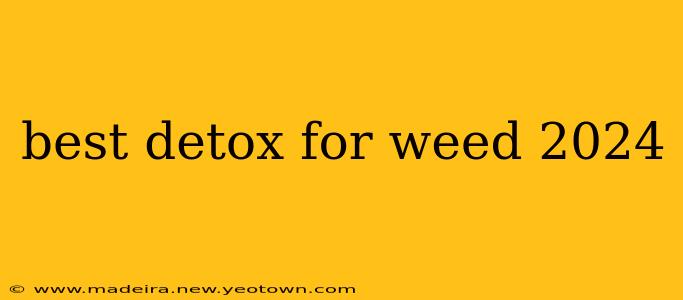The Best Detox for Weed in 2024: A Holistic Approach to Cleansing Your System
The year is 2024, and the quest for the "best detox for weed" remains a popular search. But let's be clear: there's no magic bullet. There's no single detox that guarantees a clean result, especially for frequent or heavy users. The speed and effectiveness of any detox method depend heavily on individual factors like metabolism, frequency of cannabis use, and body fat percentage. This isn't about a quick fix; it's about a holistic approach to supporting your body's natural detoxification processes.
This isn't just about passing a drug test; it's about prioritizing your overall well-being. Let's explore some strategies, debunk common myths, and help you make informed decisions.
What's the Fastest Way to Detox from Weed?
There's no single "fastest" method, as individual results vary greatly. However, combining several strategies can accelerate the process. These strategies focus on supporting your liver and kidneys, the primary organs responsible for eliminating toxins from your body.
Prioritizing Hydration and Nutrition: Think of your body as a complex machine; it needs the right fuel to function optimally. Drinking plenty of water flushes out toxins. A diet rich in fruits, vegetables, and whole grains provides essential nutrients to support liver and kidney function. Conversely, processed foods, sugary drinks, and excessive alcohol hinder the detoxification process.
Regular Exercise: Physical activity increases blood flow, aiding in the elimination of toxins. This doesn't mean you need to run a marathon; even moderate exercise like walking or cycling can make a difference.
Does Detox Tea Really Work for Weed?
Detox teas often claim to speed up the detoxification process. While some might contain ingredients that mildly support liver function (like dandelion root or milk thistle), they are unlikely to significantly impact the detection time of cannabis metabolites in a drug test. Treat these teas as complementary, rather than primary, strategies. Their benefit lies more in hydration and the potential mild diuretic effect.
How Long Does Weed Stay in Your System?
The duration of cannabis detection in your system is highly variable. Factors influencing detection time include:
- Frequency of use: Daily users will obviously take longer to clear their system than occasional users.
- Metabolism: Individual metabolic rates influence how quickly your body processes and eliminates toxins.
- Body fat percentage: Cannabis metabolites can store in fat tissue, prolonging detection time.
- Method of consumption: Smoking generally leads to faster detection than edibles, due to quicker absorption.
- Drug test type: Different tests (urine, blood, hair) have different detection windows.
Generally, THC metabolites can be detectable in urine for a few days to several weeks, blood for a few days, and hair follicles for up to 90 days or more.
What About Detox Drinks or Pills?
Many detox drinks and pills promise rapid cleansing. While some might contain diuretics to temporarily increase urine output, these products often lack scientific backing and may even carry health risks. It’s best to consult with a healthcare professional before using such products. These should never be relied on as the sole method for a detox.
The Bottom Line: A Holistic Approach
The "best" detox for weed involves a multifaceted approach focused on long-term health and well-being. Prioritize hydration, nutrition, exercise, and consider supporting your liver and kidneys naturally through diet and lifestyle choices. Avoid quick-fix products with unproven claims. Remember, consistency is key. These methods aim to improve your body's natural detoxification capabilities over time rather than providing a magic solution for immediate results. If you are facing a drug test, honesty and openness are always the best policy.
Disclaimer: This information is for educational purposes only and should not be considered medical advice. Always consult with a healthcare professional before making any decisions about your health or treatment.

